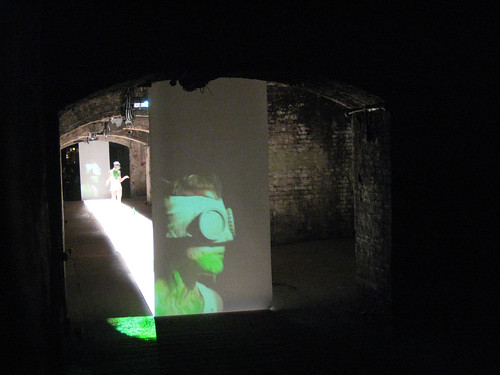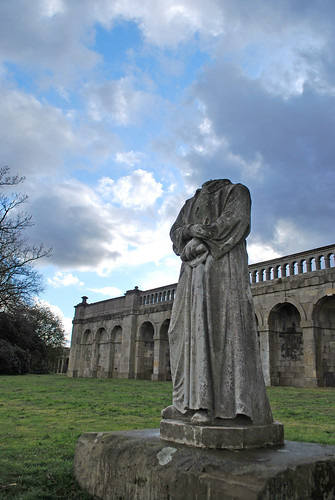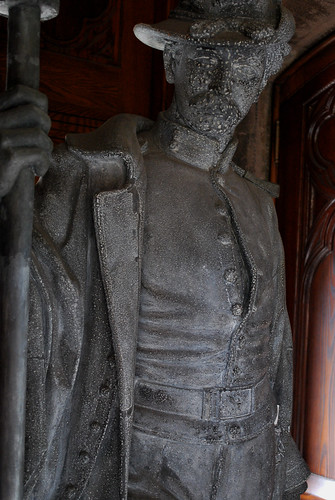
{Photo by rocketlass.}
In his introduction to last year's Oxford edition of M. R. James's Collected Ghost Stories, editor Darryl Jones quotes from James's introduction to a 1924 anthology, Ghosts and Marvels, describing it as the "nearest James ever came to a statement of theoretical principles about his chosen form." Wrote James,
Well, then: two ingredients most valuable in the concocting of a ghost story are, to me, the atmosphere and a nicely-managed crescendo.That's fine so far as it goes, though hardly an advance on Poe. It's the next portion that I find of interest: Jones explains that James thinks
The ghost story also properly belongs in the past--not necessarily the distant past; but it is important that its setting and concerns be at least a generation out of date, in a world which pre-dates technological modernity:I've been thinking about those lines off and on all month. Is James right? Do ghost stories, told best, belong perpetually thirty years ago? Or was that argument specific to his era, the difference between pre-war and postwar, the long sensecence of the old ways versus the birth of the modern?The detective story cannot be too much up-to-date: the motor, the telephone, the aeroplane, the newest slang, are all in place there. For the ghost story a slight haze of distance is desirable. "Thirty years ago," "Not long before the war," are very proper openings.Writing in 1924, James clearly conceived of his chosen form--conceived of himself--as fundamentally Victorian . . . or at best Edwardian.
Well, what's a blog for if not half-baked thoerizing? Though James's position offers nothing like a universal truth--the right writer can scare with almost anything, any time--I suspect it's still a useful way of thinking about scary stories in the near-century since he wrote it. My first inclination was to separate actual ghost stories from what I think of as the larger category of "October stories"--cull the creeps from the skin-crawlies, in essence. For ghosts, broadly defined, rather than any human manifestations of evil, were James's stock in trade. But then I thought of Ray Bradbury's perpetual 1930s--the story "The Whole Town Was Sleeping," for example, from 1950, but which tells of a slasher on the loose in a city where people still walk to the moviehouse, sit on their porches, take in boarders, chat with their neighbors. . . . Or John Collier's delicious little mousetraps, written throughout the first half of the century, but, like the stories of Wodehouse (a clear influence) located in a vague, semi-modern past. Then there are Stephen King's regular returns to a dark but also alluring 1950s. Perhaps James is on to a broader truth about how we want to take our scares?
This ties in, it's reasonable to assume, with two major threads in storytelling: the "once upon a time" compact, wherein we readers agree with the writer that if he'll tell a good story, we'll suspend disbelief, an operation more easily achieved the less we're forced to acknowledge the presence of our daily mundanity in the tale; and the fact that we first encounter stories as children, when we have the fewest intellectual and emotional defenses against them. There's a reason that writers from Tolstoy to King have obsessed over childhood--and it's not because it's some greeting card-style magic unicortopia. It's because we are still forming ourselves, and thus the world, still figuring out not only what is and what isn't, but what can and what can't be, what ought and what ought not. We are susceptible, and as adults the best way to draw us in is to remind us of that susceptibility. Make us children again, however briefly, and we're yours.
All of which leads me to a question: to keep up with James's ever-shifting window, should we now be falling for ghost stories about the early 1980s? Those years seem so plastic, so artificial, that they initially seem inhospitable to spirits.
But then you start to picture it: that party your parents threw that one hot summer night, where you and your sister were pressed into serving drinks--and told how adorable you were by James, or Jimmy, with his twitchy, red-flecked eyes, kissed on the cheek by mom's friend with the smears of glittery eyeliner. Dad's cousin got on all fours and barked like a dog and scratched at the orange shag with his leg; everyone laughed and laughed. Sheila dropped an ashtray on the kitchen floor, where it shattered, sending plumes of gray dust poofing and swirling through the room, and she said a bad word. Your sister plugged into Mom's Walkman and fell asleep early under the side table, headphones over her ears, music so loud you could hear it if you stood over there.
But you stayed awake, increasingly weary as the night drew in, like you could actually feel your bones. The conversations grew louder and more demonstrative, your mom and dad acting strange, funny and wrong at the same time. Then, feeling disoriented by the noise and smoke and music, even a little queasy, you glanced out the front window and saw on the lawn, almost glowing in the midst of the darkness, the guy in the camel-hair jacket, holding the hand of that little boy and staring, staring in at the party. And just looking at the two of them made you so sad it was like something was being taken from you, something you hadn't even known you had but now realized you desperately, tearfully wanted to keep.
Remember? All these years later, surely you remember. You have to remember, because no one else saw them; no one else would even listen when you tugged at their hands and tried to tell them. Even your sister refused to believe you the next day. But how could she? She didn't see them. She didn't have to stand there, transfixed, and read the man's lips.










